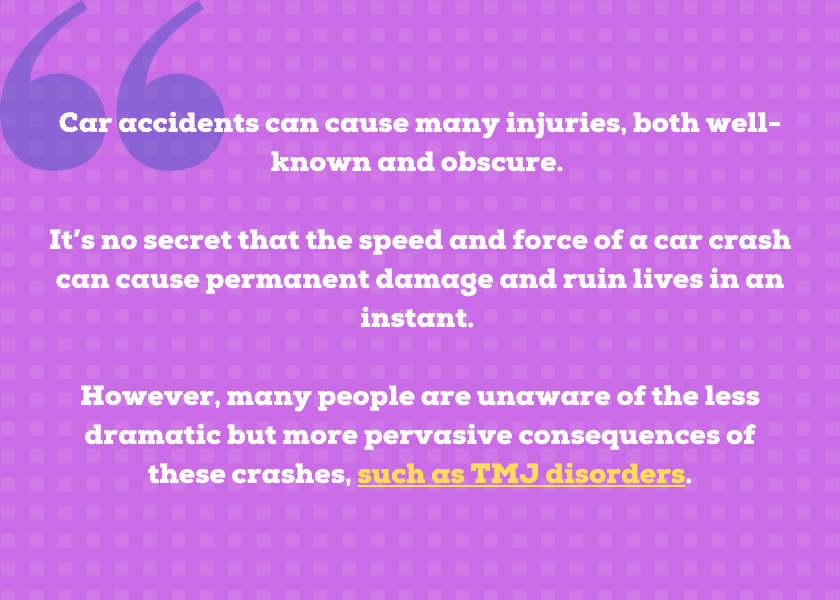Car accidents can cause many injuries, both well-known and obscure. It’s no secret that the speed and force of a car crash can cause permanent damage and ruin lives in an instant. However, many people are unaware of the less dramatic but more pervasive consequences of these crashes, such as TMJ disorders.
An injury to your TMJ, or jaw joint, can cause lifelong problems that you may never think to connect to the accident you suffered. Here’s just what TMJ disorders are and how they can affect your life forever.

What Is TMJ?
TMJ stands for “temporomandibular joint,” the two joints that help connect your jaw to your skull. They’re complex joints compared to many others in the body. Not only do they act as a hinge, but muscles around the temporomandibular joint can also slide your jaw back and forth in the socket as well as from side to side.
This complex range of motion is crucial because your jaw hinges are vital for your ability to chew food and speak clearly. There are several small but essential muscles and nerves in the area that allow you to manage daily tasks when they’re functioning correctly.
Unfortunately, the jaw joints do not always function correctly. When something goes wrong with your jaw, you’re facing a TMJ disorder, a complex set of problems that may or may not be easily treatable. Up to 15% of all adults will face some sort of TMJ disorder at some point in their lives, making it a common problem that sees little public acknowledgment.
Causes of TMJ Disorders
Problems with the temporomandibular joint can have several causes. Since the joint itself is complicated, pain and discomfort in the area may be connected to the muscles, nerves, or bones and cartilage. Unfortunately, some people are born with temporomandibular joints that are more prone to discomfort, though these people likely know about their condition from a young age.
These injuries can also be caused by accidents. Any type of harm to the face, head, and neck might cause jaw problems, including impacts and whiplash.
Car Accidents and TMJ Disorders
One of the most common and damaging causes of lifelong jaw disorders is the car accident. Few other situations can put the head and jaw under so much force so quickly. Even car accidents that don’t seem to have caused immediate injuries may have caused damage leading to slow-developing temporomandibular joint disorders.
For example, airbags can easily cause jaw pain. Quick deployment of the airbag to the chest and face puts a lot of force on the area in a split second. The whiplash effect from car accidents can also strain or permanently damage the jaw joint on its own. Either way, people may brush off the early signs of lingering jaw problems as mere soreness from the accident, only to have their jaw pain get worse for months or years afterward.
The Lifelong Effects of Temporomandibular Joint Disorders
When the temporomandibular joint is damaged, there are a number of common, painful symptoms to watch for, like:
- Jaw pain and tenderness
- Pain that’s stronger on one side
- Aching pain inside and around your ears
- Painful chewing
- Difficulty chewing
- New clicking or grating sounds in the joint
- New popping sounds when using the joint
- Indistinct facial aches
- Locking of the joint so that you cannot open or close your mouth
These symptoms come from three potential causes. First, many people will experience swelling in the joint. When any joint is damaged, your body sends extra fluid to the area to stiffen the muscles and immobilize them so everything can heal. However, this makes it difficult and painful to talk and eat for days or weeks at a time.
Second, serious car accidents can lead to nerves in the area being bruised or damaged. When you suffer nerve damage, you may experience anything from facial paralysis to shooting pains along your face.
Third, direct impacts to the area can damage the actual bone and cartilage of the jaw joint. In this case, you may be completely unable to chew or talk and will likely require surgery to repair the damage and restore joint function.
Treating TMJ Disorders
Depending on the severity of your pain, there are different treatments for TMJ disorders. Mild and temporary jaw pain cases may be treated with prescription anti-inflammatories, muscle relaxants, and pain relievers.
More severe cases, meanwhile, may require stronger methods. Many medical professionals recommend physical therapy and mouth guards as a first resort for lingering problems. For constant and debilitating pain or for structural issues, surgery is likely necessary. All of these treatments require access to and payment for medical care.
How TMJ Problems Affect People’s Lives
Depending on the severity of your TMJ disorder, your quality of life will suffer accordingly. Milder cases of jaw disorders after a car accident may simply make it difficult to talk and perform your job for a few weeks, which is bad enough.
More serious cases have more severe consequences. Nerve damage and fractured joints can take years to fully resolve, especially if doctors decide that surgery is necessary to treat the issue. Some people never recover full use of their mouth. These people experience lifelong pain, along with an impaired ability to communicate and even eat food. A single car accident can lead to years of TMJ problems and a dramatic loss of quality of life.
Take Back Your Life from TMJ
If TMJ from a car accident is impacting your life, it’s easy to feel hopeless. However, it’s treatable if you have the right support and access to medical funds. If you believe you’re suffering from a TMJ disorder after a car accident, reach out to an expert car accident attorney today. They can help you build your case, identify your problems, and see your day in court.
TMJ problems can kill your quality of life if you let them. Fight back, instead. With the right legal representation, you can fight for the compensation you need to fix your jaw problems for good.





